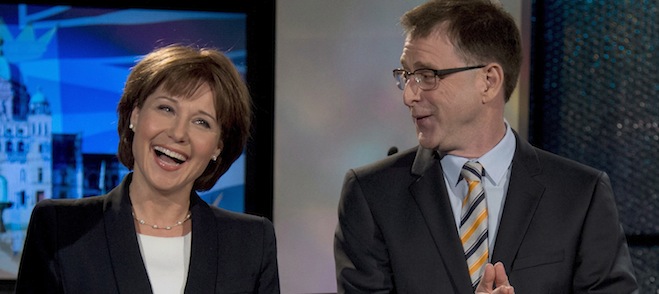B.C.’s 2013 election is down to the wire. (Or not.)
Who is going to win? Depends which pollster you trust
BC Liberal leader Christy Clark, BC and NDP leader Adrian Dix take part in a pre debate photo opt in Vancouver, B.C. Monday, April 29, 2013. British Columbians will go to the polls May 14th. THE CANADIAN PRESS/Jonathan Hayward
Share

Just weeks ago, pollsters in B.C. believed the SoCreds’ 1991 demise could be repeated this spring. Its Liberal heirs would be similarly routed, some predicted, reduced to a handful of seats.
With days to go before British Columbians head to the polls, it’s still far from clear how exactly they plan to vote. But that Liberal rout, it’s become clear, is no longer in the cards.
The yawning, 20-point lead the NDP once held over the governing Liberals has evaporated. But by how much depends on which polling outfit you trust.
An Angus-Reid poll for the Globe and Mail-CTV released yesterday had it halved, giving the NDP a nine-point edge.
But a Forum poll for the National Post released a day earlier put the NDP and Liberals in a dead heat: 43 per cent, compared to 41 per cent for the Liberals.
Then Ipsos-Reid came in down the middle, putting the NDP lead at six per cent.
So who’s right? Who knows. Remember that Wild Rose majority Alberta pollsters were predicting just three days before Albertans instead handed the majority to the Conservatives? Pollsters were similarly oblivious to the Orange surge that gave Quebec to the NDP in 2011, and the Liberal rout next door, in Ontario in that same election.
As response rates to telephone surveys have plummeted, polls have become increasingly unreliable. Pollster Allan Gregg blames the profession for having “fallen in love with the sound of its own voice,” and rushing out flimsy results.
So B.C.’s 2013 election is down to the wire. Or not. Whatever happens Tuesday, pollsters won’t be blamed for getting it wrong. With results all over the map, one at least will have to have got it right.
As for the race, it’s been a weird one. The NDP opted to run a “positive” campaign, à la Jack Layton. This has allowed the public, once so desperate to flog the Liberals for their many sins to have forgotten what it was they were so mad about in the first place.
Both the Conservatives and NDP have had to turf candidates for conduct unbecoming, though the NDP is inexplicably standing behind one, who once labelled Chinese-Canadians “chinkasaureses,” and was repeatedly caught padding her resumé.
The premier, an incredibly polarizing figure in B.C., has somehow been able to keep the conversation firmly turned to jobs and the economy, and has starkly defined the choice: four years of sound fiscal management with the Liberals’ free enterprise coalition, or runaway social spending that would send the B.C. back to its darkest era.
Christy Clark has done this despite playing fast and loose with claims of having balanced the budget, and a face-palm worthy gaffe as the campaign was in full swing—running a red on a dare from her son with a reporter along for the ride.
Adrian Dix, by flip-flopping on the twinning of an existing pipeline from Alberta to Vancouver, played into Liberal fear-mongering, scaring off centrist voters. The NDP leader is also pledging to put fracking to an environmental review, kill at least one mining proposal that has government support, and reverse the go-ahead on a new all-season resort in B.C.’s Kootenay region. Small wonder the Liberals have dubbed him Mr. Nix.
But there are some areas in which he is inclined to say yes. His party is promising new spending totalling $2 billion, including $210-million per year on a “family bonus,” for low- and moderate-income families and $100-million a year to hire more teachers (in a province which continues to see declining enrolment).
And yet Dix, who’s shown no interest in balancing the budget, somehow continues to present a moderate face. He’s gone to lengths to dampen organized labour’s heady expectations, at least for the short term, and has burnished his business credentials by making inroads in Vancouver’s business community.
He’s not unlike Stephen Harper, a plodder, methodical in his approach. He didn’t marry until his 40s. His approach to politics is equally deliberative. Just as Harper has slowly moved the country to the right, a Premier Dix could eventually push B.C. several clicks to the left. That’s the plan, anyway. We’ll know Tuesday whether British Columbians are willing to let him take them there.